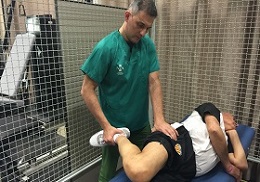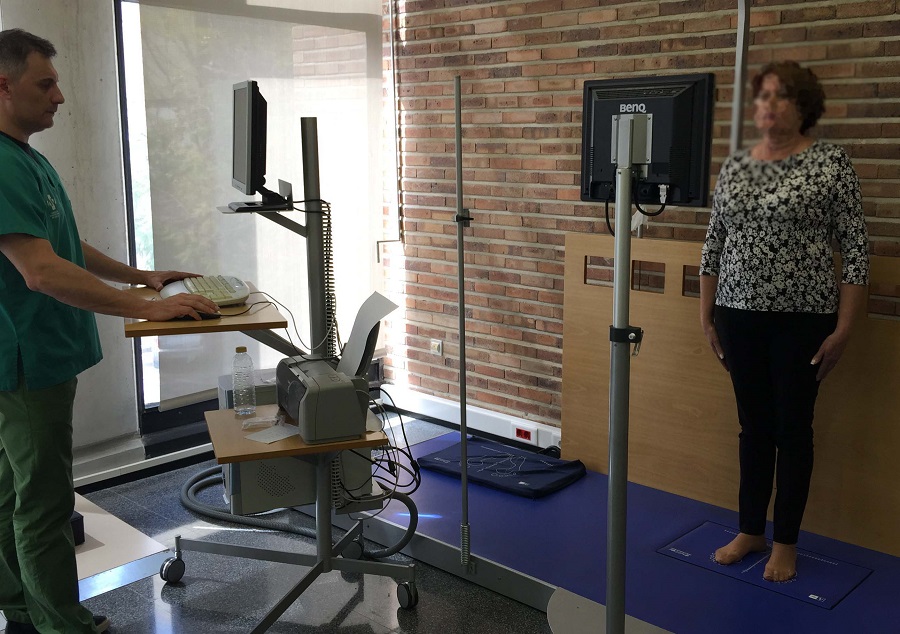
José Casaña has received the 2017-2018 outstanding PhD award for his thesis “Efectos de la aplicación de un protocolo de entrenamiento de fuerza previo a la cirugía de artroplástia total de rodilla en pacientes mayores de 60 años con artrosis de rodilla” (‘Effects of the application of a strength training protocol prior to total knee arthroplasty surgery in patients over 60 years of age with knee osteoarthritis’). The Work has been directed by José Sánchez Frutos, Pablo Renovell Ferrer and Antonio Silvestre Muñoz, from the Physiotherapy and Surgery departments of the University of Valencia. The thesis developed brings new options to the group of physiotherapy professionals that allow the design of preoperative surgery programs for knee joint replacement.
The start of José Casaña’s career as a researcher began with a scholarship granted by the University Hospital La Fe of Valencia. Since then he has participated in numerous public and private research projects. Casaña obtained a research scholarship at the National Research Center for the Working Environment, a worldwide reference institution with regard to research on musculoskeletal problems in the workplace. During this period, he developed and participated in several projects that have allowed him to publish several articles in scientific journals.
Subsequently, José Casaña created the EXINH research group (EXercise INtervention for Health) of the Physiotherapy Department of the University of Valencia. The purpose of this group is to mobilise all those with a chronic disease to incorporate into their daily routines a series of therapeutic physical exercises that can be beneficial.
He is currently developing several studies jointly with health professionals at the Arnau de Vilanova Hospital, under the agreement between the Regional Ministry of Health and the University of Valencia. These studies are intended to create therapeutic exercises for chronic patients.
What difficulties have you encountered while undertaking the thesis?
The most significant one has been the little economic help. However, my case is very exceptional and particular, since the fact that I was working facilitated the research process. Thanks to that I have been able to pay for some things, such as lodging, travel and other expenses.
What continuity does your research have?
The work has a clear continuity, since it has allowed us to establish one of the main bases within our lines of research: the design and use of reinforcement programs that can serve as a therapeutic element in special populations.
What do you think your research contributes to the scientific community as a whole and to society?
The work developed in the thesis brings new options to the group of physiotherapy professionals to propose preoperative programs to patients who are on the waiting list to undergo knee joint replacement surgery.
It is an option in which the patient has an active participation in order to better withstand the stress of surgery. This has postoperative benefits, such as a decrease in hospital stay or a more rapid normalisation of its functions.
On a personal level, it has helped me achieve one of the goals pursued by any researcher. I have been able to develop new tools with a low cost –for the system–, a simple application –factor that affects the therapist– and a great effectiveness –beneficial for patients–.
What applicability can your work have?
It has a 100% complete and absolute applicability. It is a proposal that has demonstrated that the preparation of the patients with exercises that strengthen the area before performing the surgery guarantees the postoperative benefits mentioned above. It is a procedure that can be very beneficial for patients.
Does getting a Doctorate facilitate employability?
In my particular case, this has not been the case, since I was already working at the University of Valencia as a collaborating professor and being a doctor was not an essential requirement to be able to occupy this position. When hiring this type of teaching figure, the previous work experience was taken into account.
With the disappearance of this figure, added to my intention to get a promotion, it is true that the PhD helped me to get accredited and to be able to choose new positions.
Would you recommend starting doctoral studies? What advice would you give to a person who wants to get a PhD?
Whenever the interested person wants to investigate and devote himself/herself to this beautiful activity, getting a PhD is a necessary step that must be taken. But you also have to be clear that it is not a simple step, but it is much more than that. For this reason, I advise my current doctoral students to enjoy the experience, since their thesis may mark the path of their interest and their dedication in the future.
Have you actively participated in outreach activities and scientific communication? How important do you think these activities are?
Yes, several times. And I have done it through different platforms, such as infographics, press articles, video-advise, workshops and conferences, talks in secondary schools, sports clubs, health centres... Dissemination has more and more relevance and I consider that it is an important task although it is not very much valued.
Regarding the dissemination of my thesis and my publications, I only use the Research Gate network, and in terms of social networks, Instagram to show exercises and other resources for physiotherapists.








